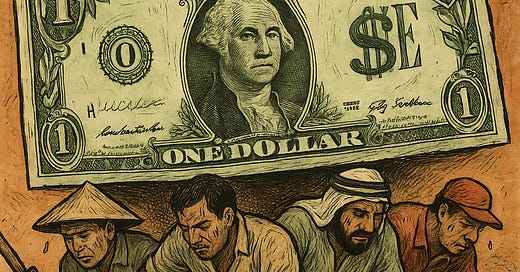Beyond SWIFT: How China’s Digital Yuan Challenges U.S. Hegemony
We’re witnessing a major shift in the global economy that our corporate-media is ignoring. The People’s Bank of China has just announced that its digital currency system, the digital yuan, will now be connected to ten countries in Southeast Asia and six in the Middle East. That means nearly 40% of global trade could soon move outside the U.S.-dominated SWIFT network, bypassing the dollar altogether.
The SWIFT network is a system that banks and other financial institutions use to send secure messages to each other about financial transactions. It helps with things like international money transfers and currency exchanges, but it doesn't actually move the money itself.
This is a wake-up call. While billionaires and big banks continue to rig the system at home, countries around the world are building alternatives. If we don’t invest in working people, rebuild our infrastructure, and stop catering to Wall Street, we’re going to find ourselves falling behind; not just economically, but morally.
For too long, the U.S. dollar has sat heavy on the world’s shoulders, its greenback soaked in the sweat of workers from Jakarta to Juárez. It has functioned not merely as a currency but as a weapon, a surveillance tool, and a bribe. The dollar buys not only oil and arms but silence and submission. Sanctions, dictated from glass towers in Washington, have punished whole nations for the sin of resisting U.S. hegemony. And now, in the glint of a digitized renminbi, there lies a glimmer of something else.
China’s digital yuan, or e-CNY, is a central bank digital currency, yes. But it is also a narrative disruptor. It tells a different story about money; one that doesn’t pass through JPMorgan or require blessings from the IMF. It moves without the priesthood of SWIFT, without the baptism of dollars. It proposes, at least in theory, a financial system less dependent on the consent of American elites.
Yet let us not be naïve. This isn’t a workers’ revolution. The digital yuan is no people’s currency. It is still born of a state apparatus that surveils, punishes, and disciplines its citizens. It is a tool of the Chinese Communist Party, which has long since traded socialist ideals for techno-authoritarianism and export-fueled state capitalism. But even within its constraints, it represents a crack in the neoliberal consensus; a rebellion not of the masses, but of empires. It’s Beijing saying: we too can make the rules.
The timing could not be more telling. Under the blundering hand of Donald Trump, the United States has alienated traditional allies, gutted international norms, and turned diplomacy into spectacle. His economic nationalism has made the dollar feel like a loaded gun pointed at the rest of the world. His trade wars were less about justice than tantrums. And his vision of American greatness is a fortress surrounded by moats, tariffs, and Twitter-fueled paranoia.
In this context, the appeal of a digital currency not tied to Washington's whims grows stronger. Brazil, Russia, even parts of the EU, flirt with the idea. Saudi Arabia, long a vassal of the petrodollar, now trades oil in yuan. Slowly, unevenly, the scaffolding of dollar supremacy begins to rust.
And what does the American working class gain from this empire? What reward is there for the millions living paycheck to paycheck in the richest country in history? For the union workers whose factories were hollowed out by globalization, for the teachers buying supplies from their own pockets, for the baristas and warehouse workers and gig drivers stitched together by side hustles and broken dreams?
The dollar may reign, but it does not serve them.
In truth, the decline of dollar hegemony may open space; not for more imperial powers to rise, but for people’s movements to imagine new economic relationships. If global trade is no longer dictated solely by the interests of U.S. capital, might there be room for cooperation over extraction, for solidarity over sanctions?
But this hope is fragile. The U.S. government, drunk on its own exceptionalism, continues to pour resources into defense and surveillance while its own infrastructure crumbles. Trump, and those who mirror his ethos, will not save American workers. They will sell them stories about greatness while hollowing out the very systems that sustain them. And if the U.S. response to the digital yuan is more militarism, more control, more Wall Street bailouts, then it will have learned nothing.
The digital yuan does not offer utopia. It is not a socialist solution. But it is a sign that the old order is in flux. That something is shifting in the tectonics of global trade. It is a symptom of a system cracking under its own weight. And in the cracks, sometimes, light gets in.
Perhaps, in the stillness between empires, ordinary people, workers, organizers, dreamers, can find room to build something else. Something that doesn’t require dollars or data mining, but trust, care, and solidarity. Something that neither Trump’s nationalism nor Xi’s technocracy can contain.




